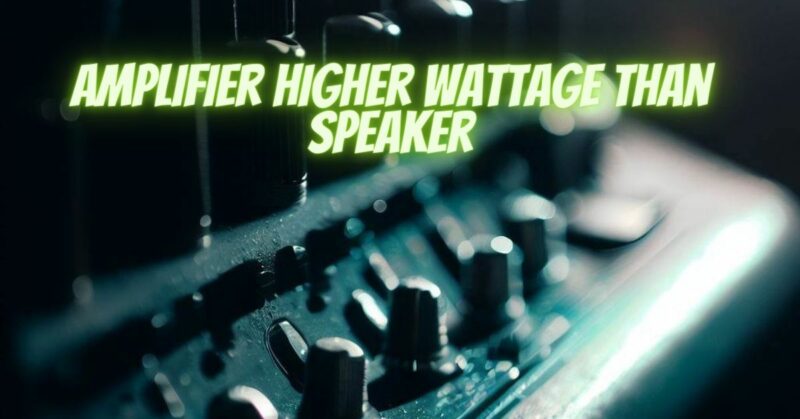Matching amplifier wattage to speaker specifications is crucial for a harmonious audio setup. However, there might be instances where you consider using an amplifier with higher wattage than the speakers. In this article, we will explore the implications of this decision, including potential benefits and drawbacks, to help you make an informed choice for your audio system.
Understanding Amplifier Wattage and Speaker Power Handling
Amplifier wattage refers to the amount of power an amplifier can deliver to the speakers. Speaker power handling indicates the maximum amount of power a speaker can handle without distortion or damage. Ideally, you want to match the amplifier’s wattage to the speaker’s power handling for optimal performance.
Benefits of Using Higher Amplifier Wattage
- Clean Headroom: Using an amplifier with higher wattage provides clean headroom – the extra power that prevents distortion when the volume peaks. This ensures that your music remains clear and dynamic even at higher volumes.
- Dynamic Range: A more powerful amplifier can reproduce the dynamic range of music accurately. This means softer passages and explosive crescendos will be faithfully represented without distortion.
- Enhanced Bass Response: Higher wattage can enhance the bass response, providing a fuller and more impactful low-end sound.
Drawbacks of Using Higher Amplifier Wattage
- Risk of Overpowering Speakers: The most significant drawback is the risk of overpowering your speakers. If the amplifier delivers more power than the speakers can handle, it can cause damage to the speakers, including voice coil burnout or cone deformation.
- Reduced Lifespan: Consistently using an amplifier with higher wattage can lead to faster wear and tear on your speakers, potentially shortening their lifespan.
- Mismatched Sound Characteristics: If the amplifier’s power output significantly exceeds the speaker’s power handling, the speakers might not respond optimally, leading to a mismatch in sound characteristics and potentially affecting sound quality.
Mitigating the Implications
- Clean Headroom Calculation: If you decide to use an amplifier with higher wattage, calculate clean headroom carefully. Aim for around 1.25 to 1.5 times the speaker’s power handling to prevent distortion.
- Adjustment and Caution: If using a more powerful amplifier, exercise caution when increasing the volume. Monitor for distortion or strain and make adjustments as needed.
- Speaker Compatibility: Choose speakers with power handling that is compatible with the higher amplifier wattage to mitigate the risk of damage.
Using an amplifier with higher wattage than the speakers can have both benefits and drawbacks. Clean headroom, improved dynamic range, and enhanced bass response are potential advantages. However, the risk of overpowering speakers and potentially reducing their lifespan should not be taken lightly. If you choose to pursue this route, careful calculation, speaker compatibility, and responsible usage are essential. Ultimately, the decision should align with your audio goals and prioritize the longevity and integrity of your speakers.


